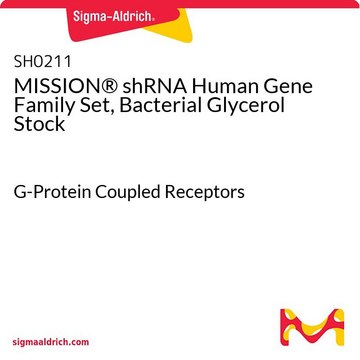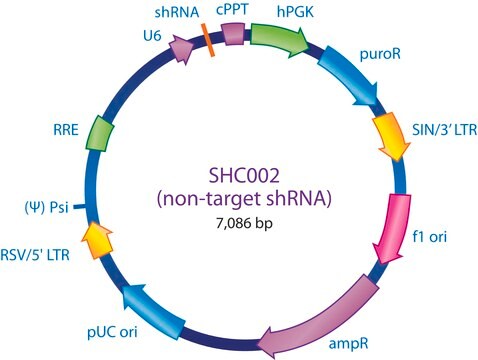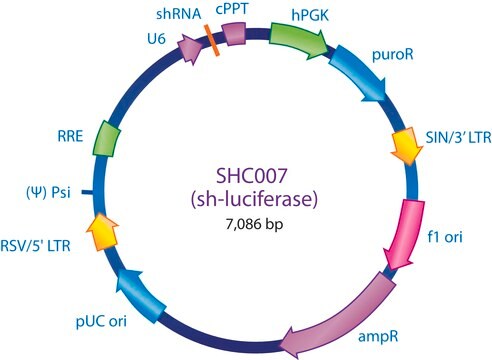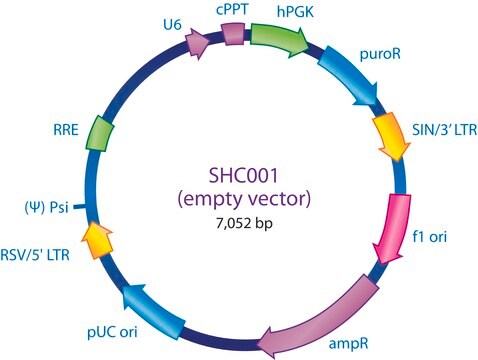おすすめの製品
関連するカテゴリー
詳細
レンチウイルス粒子(抜き取り試験でプレート力価測定)は、簡単に識別できるようにバーコードがついた96ウェルプレートで販売されています。必要以上の凍結/融解をしないように、そしてウイルス粒子の機能を最大にするために、4×50 μLの小分け包装で供給されます。各遺伝子ファミリーセットの力価は抜き取り試験(クローンの10%)により確認されています。完全に力価確認されたセットもご購入いただけます。詳しくはRNAi@sial.comまでお問い合わせください。遺伝子ファミリーセットと一緒に、RefSeq、遺伝子の解説、遺伝子シンボル、クローンID、ヘアピン配列、遺伝子座同士のつながり、およびプレートマップポジションを収録したCDが付いてきます。
その他情報
TRCライブラリーは常にアップデートされているため、ご購入の時点での正確な遺伝子およびクローンの数は多少変更されている場合があります。
各MISSION shRNAクローンは、レンチウイルスプラスミドベクターpLKO.1-Puroのコンストラクト後に、大腸菌を形質転換しています。pLKO.1-Puroベクターには、細菌用抗生物質(アンピシリン)耐性遺伝子と哺乳動物用抗生物質(ピューロマイシン)耐性遺伝子が組み込まれており、細菌細胞株、哺乳類細胞株のどちらにも利用できます。各クローンセットは、独自のアルゴリズムを用いて各ターゲット遺伝子に対してデザインされた平均3~5のコンストラクトが含まれています。したがって、各遺伝子セットのうち少なくとも1クローンは70%以上のノックダウンレベルを示すため、これらのクローンセットを使用することにより、幅広いノックダウン効率が予測されます。これにより、遺伝子機能の消失の影響について幅広いノックダウン効率で検討できます。各shRNAコンストラクトはクローニングされており、ターゲット遺伝子に確実にマッチするよう配列が確認されております。
販売されているその他の遺伝子ファミリーセットの詳細なリストは、遺伝子ファミリーセットのウェブサイトをご覧ください。
Number of Genes:746, Number of Clones: 9418
Avg. Clones per Gene: 12.6
Avg. Clones per Gene: 12.6
法的情報
本製品の使用にはライセンス契約が1つ以上必要となります。詳細はhttp://sigmaaldrich.com/missionlicenseをご覧ください。
MISSION is a registered trademark of Merck KGaA, Darmstadt, Germany
関連製品
保管分類コード
12 - Non Combustible Liquids
WGK
WGK 3
引火点(°F)
Not applicable
引火点(℃)
Not applicable
適用法令
試験研究用途を考慮した関連法令を主に挙げております。化学物質以外については、一部の情報のみ提供しています。 製品を安全かつ合法的に使用することは、使用者の義務です。最新情報により修正される場合があります。WEBの反映には時間を要することがあるため、適宜SDSをご参照ください。
カルタヘナ法
カルタヘナ法
試験成績書(COA)
製品のロット番号・バッチ番号を入力して、試験成績書(COA) を検索できます。ロット番号・バッチ番号は、製品ラベルに「Lot」または「Batch」に続いて記載されています。
David Murdoch et al.
Current opinion in oncology, 20(1), 104-111 (2007-11-29)
(1) Many of the significant advances in cancer management in recent years have centered on the development and introduction of molecularly targeted therapies, such as monoclonal antibodies and tyrosine kinase inhibitors.(2) Despite targeted therapy that has clearly benefited and even
G Manning et al.
Science (New York, N.Y.), 298(5600), 1912-1934 (2002-12-10)
We have catalogued the protein kinase complement of the human genome (the "kinome") using public and proprietary genomic, complementary DNA, and expressed sequence tag (EST) sequences. This provides a starting point for comprehensive analysis of protein phosphorylation in normal and
Virendra S Gomase et al.
Current drug metabolism, 9(3), 255-258 (2008-03-14)
Kinomics is derived from the word kinome that is the kinase part of the proteome. Kinomics is a merger between genomics and proteomics. Defining the kinase complement of the human genome, the kinome, has provided an excellent starting point for
R Zufferey et al.
Nature biotechnology, 15(9), 871-875 (1997-11-05)
Retroviral vectors derived from lentiviruses such as HIV-1 are promising tools for human gene therapy because they mediate the in vivo delivery and long-term expression of transgenes in nondividing tissues. We describe an HIV vector system in which the virulence
Sheila A Stewart et al.
RNA (New York, N.Y.), 9(4), 493-501 (2003-03-22)
Genome-wide genetic approaches have proven useful for examining pathways of biological significance in model organisms such as Saccharomyces cerevisiae, Drosophila melanogastor, and Caenorhabditis elegans, but similar techniques have proven difficult to apply to mammalian systems. Although manipulation of the murine
ライフサイエンス、有機合成、材料科学、クロマトグラフィー、分析など、あらゆる分野の研究に経験のあるメンバーがおります。.
製品に関するお問い合わせはこちら(テクニカルサービス)








